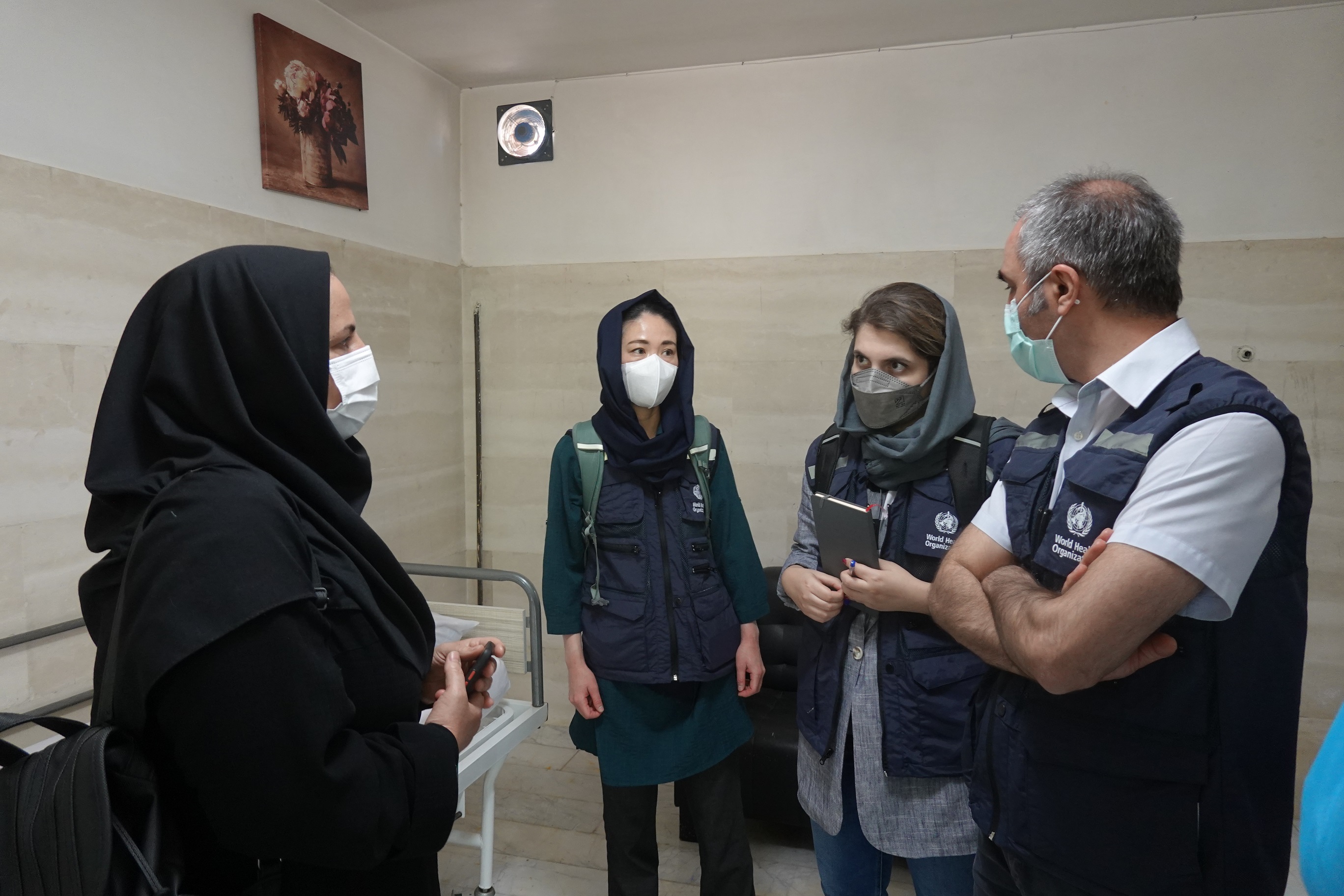 WHO and the State Welfare Organization teams visit an isolation room in a nominated long-term care facility in Tehran province. Credit: WHO/Islamic Republic of Iran
WHO and the State Welfare Organization teams visit an isolation room in a nominated long-term care facility in Tehran province. Credit: WHO/Islamic Republic of Iran
11 July 2022 – The World Health Organization (WHO) country office in the Islamic Republic of Iran, along with the project-implementing partners, conducted on-site visits to 3 shortlisted long‑term care facilities under the EU and Canada co-funded project. This project, titled “Improving access to inclusive health care in long-term care facilities and enhancing the quality of life and dignity of the most vulnerable populations in Islamic Republic of Iran during the time of emergencies and pandemics” (such as COVID), aims to contribute to achieving universal health coverage for the elderly and people living with disabilities in the country.
 During the field visit to a long-term care facility in Alborz province, the team observed the infrastructure and procedures in the laundry room. Credit: WHO/Islamic Republic of Iran Site visits were conducted to further align project interventions in developing operational guidelines for infection prevention and control, and environmental and occupational risk reduction with the local context and ensure proper addressing of needs and priorities in long-term care facilities focusing on standard solutions that are also feasible and affordable by centres. In addition, on-site pre-assessment of nominated isolation rooms has evaluated the readiness and provided technical advice to prepare infrastructure for the installation of equipment.
During the field visit to a long-term care facility in Alborz province, the team observed the infrastructure and procedures in the laundry room. Credit: WHO/Islamic Republic of Iran Site visits were conducted to further align project interventions in developing operational guidelines for infection prevention and control, and environmental and occupational risk reduction with the local context and ensure proper addressing of needs and priorities in long-term care facilities focusing on standard solutions that are also feasible and affordable by centres. In addition, on-site pre-assessment of nominated isolation rooms has evaluated the readiness and provided technical advice to prepare infrastructure for the installation of equipment.
Following the project steering committee’s decision to visit these facilities, the WHO country office, along with members of the project steering committee, including the Ministry of Health and Medical Education, State Welfare Organization, and members from professional associations and national nongovernmental organizations, conducted field visits to 3 nominated facilities in Tehran, Qom, and Alborz provinces. Through coordination and execution of activities by implementing partners, 30 prioritized facilities in 14 provinces will be equipped with standard isolation rooms and services during 2022–2023 and be provided with risk reduction operational guidelines.
 A caregiver in a room filled with arts and crafts made by residents in a nominated long-term care facility for developmental disabilities in Tehran province. Credit: WHO/Islamic Republic of IranFurthermore, the project will expand the capacity of caregivers and service providers in long-term care facilities with above 150 residents to ensure the delivery of tailored services and quality care. In addition to the target group living in these facilities, the project will also provide the most needed assistive technologies for around 1000 persons with severe disabilities who do not have access to rehabilitation services. A total of over 6000 older persons and people living with disabilities will have access to standardized care as a result of this joint project.
A caregiver in a room filled with arts and crafts made by residents in a nominated long-term care facility for developmental disabilities in Tehran province. Credit: WHO/Islamic Republic of IranFurthermore, the project will expand the capacity of caregivers and service providers in long-term care facilities with above 150 residents to ensure the delivery of tailored services and quality care. In addition to the target group living in these facilities, the project will also provide the most needed assistive technologies for around 1000 persons with severe disabilities who do not have access to rehabilitation services. A total of over 6000 older persons and people living with disabilities will have access to standardized care as a result of this joint project.
The results of these visits will enhance the project implementation and improve the accuracy of services for the target group based on lessons learned from COVID-19, people living with disabilities, and older persons.


